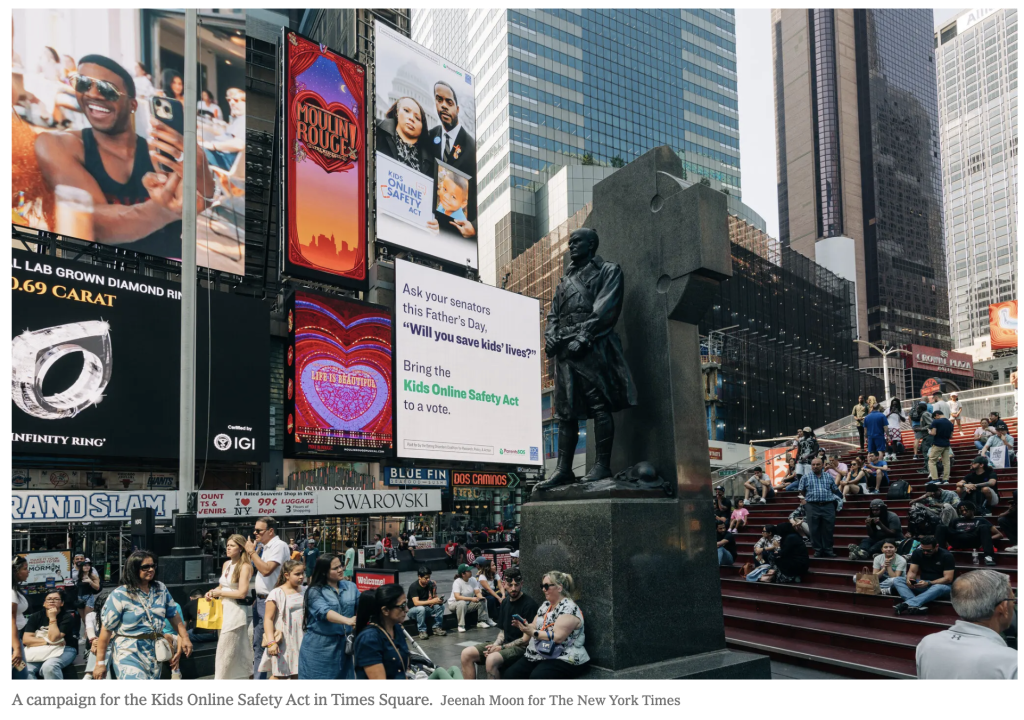With Public Support & Momentum at Their Backs, Advocates Call for Final KOSA Votes and Passage Into Law
As parent advocates rally for a summer of action to push the Kids Online Safety Act (KOSA) over the finish line and into law, hopes that Congress will heed the public and take action this year to protect kids and teens online are very much alive. However, in the face of deep-pocketed Big Tech opposition, final votes and passage remain up in the air despite unprecedented levels of support from lawmakers and the public.
From a billboard in Times Square, parent advocates Todd and Mia Minor ask lawmakers:
“Will you save kids’ lives?”
(NYT, 6/22/24)
The next two weeks are a critical window for lawmakers to act. With the Surgeon General’s history-making statement that social media platforms should carry warning labels, potential discussion of KOSA and kids’ safety online during Thursday night’s presidential debate, and few days remaining on the legislative calendar, the time is now to push for KOSA floor votes in both the House and Senate. Here’s a summary of the recent KOSA news emerging from Capitol Hill and message guidance for allies and advocates this week as a key House committee takes action:
Breakthrough momentum in the House
Just weeks ago, the House Energy and Commerce Innovation, Data, and Commerce Subcommittee made history by passing the bipartisan legislation out of committee. The legislation could potentially be noticed for full committee markup as early as this week, which could tee up final committee passage and a floor vote. Support among Members of Congress and their constituents for the House’s Kids Online Safety Act is stronger than ever.
NYT – These Grieving Parents Want Congress to Protect Children Online (Cecilia Kang, 6/22/24)
“Dozens of parents are lobbying for … KOSA, a bill that would require social media, gaming and messaging apps to limit features that could heighten depression or bullying or lead to sexual exploitation … (which) has the greatest momentum of any broad tech industry legislation in years. The bill, introduced in 2022, has bipartisan support in the Senate and is poised for a vote. It recently passed a key House subcommittee vote. President Biden has also supported the bill.”
The Hill – Majority of battleground voters support kids’ online safety laws (Rebecca Klar, 6/17/24)
“The majority of voters in battleground House districts said they support the government passing laws aimed at improving safety for kids and teens online. There was strong bipartisan support for passing kids’ online safety rules … Seventy-eight percent of voters said they would support KOSA, including 83 percent of Democrats and 78 percent of Republicans.”
Mixed messages in the Senate
Meanwhile, despite KOSA’s sponsorship by over two-thirds of the U.S. Senate and passage through committee, advocates continue to receive mixed messages on when a floor vote might happen, and on the reasons behind the holdup.
HuffPost – Bipartisan Bill To Protect Kids From Social Media Harms Stalled In Senate (Arthur Delaney, 6/20/24)
“A bill aimed at forcing tech companies to protect children from the dangers of social media has stalled in the U.S. Senate despite overwhelming bipartisan support … parents who’ve lost children because of online harms — such as the viral “blackout challenge” on TikTok — sent Schumer a letter earlier this week saying that he’d pledged to hold a vote on the bill by Thursday. The vote didn’t happen … the Kids Online Safety Act seems stuck on the back burner.”
Raw Story – A law to protect kids online? It might just happen now (Matt Laslo, 6/20/24)
“Senate Majority Leader Chuck Schumer seems to have overcome a major roadblock in his own party who’s holding up legislation designed to protect children from online harm … Wyden’s support is seen as a huge step forward, because he’s had a hold on the broadly bipartisan measure for months now.”
Message Guidance
As with any legislation that seeks to meaningfully stop Big Tech’s predatory business model from hurting children and teens, industry-backed misinformation is rampant. So let’s set the record straight about what the bill does:
- KOSA requires social media platforms to proactively design their platforms and algorithms with safety and well-being in mind— that means not promoting or exacerbating specific mental health conditions like anxiety, depression, eating disorders, substance use disorder and suicidal ideation, or facilitating bullying, sexual exploitation, or the sale of illicit drugs to minors.
- KOSA gives minors tools to restrict the collection and public visibility of their private information and to opt out of manipulative algorithmic recommendations
- KOSA disables addictive product features like autoplay and infinite scroll.
- KOSA enables the strongest safety settings by default.
- KOSA holds online platforms accountable through annual, independent auditing.
Bottom Line: It’s time for Congress to listen to parents and advocates and bring KOSA to the House and Senate floors for a vote.
Relevant Polling
TOP/PPP House Battleground District Poll – June 2024
- 81% of Americans think it is important for the President and Congress to address social media’s harmful impact on children and teens.
-
-
- 81% of respondents support government passing laws to put responsible safeguards in place to protect children and teens online.
- 78% of Americans support the Kids Online Safety Act.
- Only 13% oppose the measure.
-
- 56% of respondents would be more likely to vote for their Member of Congress next time if they supported the Kids Online Safety Act.
-
- Only 8% of respondents said they would be less likely to vote for their Member of Congress based on their KOSA support.
TOP/PPP Tech CEO National Poll – April 2024
- Nearly 60% of Americans trust the federal government or state governments to make policy decisions that affect the tech industry.
-
-
- By contrast, only 5% of Americans trust big tech executives to make policy decisions that impact the industry.
-
- There was no statistical downside to messaging critically on Big Tech’s record or its CEOs.
-
- Both Democrats, Republicans, and Independents were more likely to disapprove of Big Tech after hearing negative messaging.
Commonsense Media/Lake Research/Echelon Insights National Poll – January 2024
- Teens, young adults, and voters think we are in a crisis now, and less than a majority believe things will get better.
-
- 78% of voters and 60% of teens think that politicians and elected officials are not doing well, reflecting the needs, desires, and experiences of younger people in this country.
- 67% of voters say the federal government spends too little on investments that benefit children and youth.
Reset/Hart Strategies National Poll – May 2023
- Social media companies are unpopular, and social media is seen as harmful to children and teens.
-
-
- More voters have negative than positive views of social media companies: 21% favorable, 50% unfavorable, and 29% neutral/no opinion.
- Parents also hold more negative than positive views of them: 25% favorable, 41% unfavorable, and 33% neutral/no opinion.
-
- Voters and parents think social media’s harms outweigh its benefits for society overall, particularly for children and teens.
-
-
- Voters feel that the harms of social media outweigh benefits for our society overall by 35% to 16%.
- Parents also feel that the harms outweigh the benefits by 37% to 17%.
-
- Large majorities of voters and parents want President Biden and Congress to place a priority on addressing the impact of social media on young people.
-
- Two in three voters (67%) and nearly three in four parents (73%) feel it is important for President Biden and Congress to take action to address the impact of social media on young people.
- Large majorities of Democrats (69%), independents (62%), and Republicans (67%) think it is important.
(NOTE: This survey oversamples voters in five states: Maryland, Michigan, Minnesota, North Carolina, and Pennsylvania)
Tools and Resources
- KOSA One-Pager (Bilirakis-Castor)
- KOSA Fact Sheet (Commonsense Media)
- KOSA Fact Sheet Addressing Harms (Fairplay and PSOS)
- Surgeon General Vivek H. Murthy: Why I’m Calling for a Warning Label on Social Media Platforms
- Social Media Health Advisory (American Psychological Association)
- Prevalence of Design Harms Among Youth (LogOff and Accountable Tech)
###

